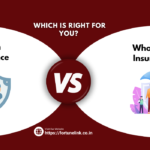
Choosing the right life insurance cover is a critical financial decision that can have lasting impacts on your financial security and that of your loved ones. With various types of life insurance available, it’s essential to understand the options and select the one that best aligns with your needs and goals. In this comprehensive guide, we’ll explore the different types of life insurance cover and help you determine which one is right for you.
Understanding the Basics of Life Insurance
Life insurance is a contract between an individual and an insurance company. In exchange for regular premium payments, the insurance company provides a death benefit to the policyholder’s beneficiaries upon their death. This financial protection can be used to cover living expenses, debts, education costs, and other financial needs.
Types of Life Insurance Cover
Life insurance policies come in various forms, each with unique features and benefits. The main types of life insurance cover are term life, whole life, universal life, variable life, and indexed universal life insurance.
1. Term Life Insurance
Overview: Term life insurance provides coverage for a specific period, typically 10, 20, or 30 years. If the policyholder dies during the term, the beneficiaries receive the death benefit. If the policyholder outlives the term, the coverage ends, and no benefits are paid out.
Advantages:
• Affordability: Term life insurance premiums are generally lower than those for permanent policies, making it an affordable option for many.
• Simplicity: The straightforward nature of term life insurance makes it easy to understand and manage.
• Flexibility: Policyholders can choose the term length that best fits their financial situation and coverage needs.
Disadvantages:
• Temporary Coverage: Once the term ends, coverage stops, which means no payout if the policyholder outlives the term.
• No Cash Value: Term life insurance does not build cash value; it purely provides a death benefit.
Best For:
• Individuals seeking affordable coverage for a specific period, such as while raising children or paying off a mortgage.
2. Whole Life Insurance
Overview: Whole life insurance provides lifelong coverage, as long as premiums are paid. In addition to the death benefit, whole life policies accumulate cash value, which grows over time on a tax-deferred basis.
Advantages:
• Lifetime Coverage: Whole life insurance guarantees coverage for the policyholder’s entire life.
• Cash Value: The policy accumulates cash value, which can be borrowed against or withdrawn.
• Stable Premiums: Premiums remain constant throughout the policyholder’s life.
Disadvantages:
• Higher Premiums: Whole life insurance premiums are significantly higher than those for term policies.
• Complexity: These policies can be more complicated to understand due to their investment component.
Best For:
• Individuals looking for permanent coverage and those interested in the cash value component for future financial flexibility.
3. Universal Life Insurance
Overview: Universal life insurance offers flexible premiums and adjustable death benefits. These policies also build cash value, which earns interest based on current market rates or a fixed rate.
Advantages:
• Flexibility: Policyholders can adjust premium payments and death benefits to fit changing financial circumstances.
• Cash Value Growth: Cash value accumulates over time and can be used for loans or withdrawals.
• Lifelong Coverage: Like whole life insurance, universal life insurance provides coverage for life.
Disadvantages:
• Complexity: Universal life insurance can be challenging to understand due to its adjustable nature.
• Variable Returns: The cash value growth can fluctuate based on interest rates, impacting the policy’s overall value.
Best For:
• Individuals seeking flexible coverage options and those who want to adjust their policy as their financial needs change.
4. Variable Life Insurance
Overview: Variable life insurance combines death benefit protection with investment options. Policyholders can invest the cash value in various sub-accounts, similar to mutual funds, which can grow or lose value based on market performance.
Advantages:
• Investment Opportunities: Policyholders can choose investment options that align with their risk tolerance and financial goals.
• Potential for Higher Returns: The cash value has the potential to grow significantly if the investments perform well.
• Lifetime Coverage: Provides coverage for the policyholder’s entire life.
Disadvantages:
• Market Risk: The cash value can decrease if investments perform poorly.
• Complexity: Understanding and managing the investment component can be challenging.
• Higher Costs: Variable life insurance policies often have higher fees and expenses.
Best For:
• Individuals comfortable with investment risks and those looking for the potential for higher cash value growth.
5. Indexed Universal Life Insurance
Overview: Indexed universal life insurance offers flexible premiums and death benefits, with the cash value tied to the performance of a specific stock market index, such as the S&P 500.
Advantages:
• Growth Potential: Cash value can grow based on the performance of the selected index.
• Downside Protection: These policies often have a floor, protecting the cash value from market losses.
• Flexibility: Policyholders can adjust premiums and death benefits.
Disadvantages:
• Cap Limits: The growth potential may be capped, limiting the maximum returns.
• Complexity: Understanding the indexing method and policy terms can be difficult.
• Variable Costs: Fees and costs can fluctuate, affecting the cash value.
Best For:
• Individuals looking for growth potential with some level of protection against market downturns.
Choosing the Right Life Insurance Cover
Selecting the right life insurance cover depends on various factors, including your financial goals, budget, and personal circumstances. Here are some steps to help you choose the best policy:
- Assess Your Needs
Determine why you need life insurance. Consider factors such as income replacement, debt repayment, education funding, and covering final expenses. Understanding your specific needs will help narrow down the right type of coverage. - Evaluate Your Budget
Consider how much you can afford to pay in premiums. Term life insurance is generally more affordable, making it suitable for those on a tighter budget. Permanent policies, while more expensive, offer additional benefits such as cash value accumulation. - Consider Your Financial Goals
Think about your long-term financial goals. If you’re looking for lifelong coverage with an investment component, whole life or variable life insurance might be appropriate. If you need flexible premiums and death benefits, universal life or indexed universal life insurance could be a better fit. - Compare Policies
Research and compare different policies from various insurers. Pay attention to premium costs, coverage amounts, cash value growth potential, and policy terms. Online tools and calculators can help you compare options effectively. - Consult a Financial Advisor
A financial advisor can provide personalized guidance based on your individual circumstances and goals. They can help you understand the pros and cons of each type of life insurance and recommend the best policy for your needs.
Conclusion
Life insurance is a critical component of a comprehensive financial plan, providing essential protection for your loved ones. By understanding the different types of life insurance cover and evaluating your specific needs and goals, you can choose the right policy to secure your financial future. Whether you opt for term life, whole life, universal life, variable life, or indexed universal life insurance, the key is to select a policy that offers the right balance of coverage, affordability, and flexibility for your unique situation.
About Fortunelink
At Fortunelink, we’re dedicated to helping you navigate the complexities of life insurance and find the perfect coverage for your needs. With a commitment to transparency, expertise, and personalized service, we offer a comprehensive range of life insurance solutions tailored to meet your unique financial goals. Contact us today to start your journey toward financial security and peace of mind.
Connect with Us
🔗 Visit our website: fortunelink.co.in
📞 Call us: +91 8788885812
📧 Email: info@fortunelink.co.in
#LifeInsurance #FinancialPlanning #InsuranceCoverage #FortuneLinkFinance #TermLife #WholeLife #UniversalLife #VariableLife #IndexedUniversalLife #FinancialSecurity #WealthBuilding #InsuranceAdvice #PeaceOfMind


 Previous Post
Previous Post Next Post
Next Post